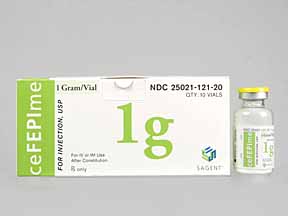
Cefepime Coupons & Savings Card – Discount Prices from $1.01
Cefepime, also known by the brand name Maxipime, is an antibiotic used to manage a variety of bacterial infections, including pneumonia, skin infections, stomach infections, and urinary tract infections (UTIs). As a fourth-generation cephalosporin antibiotic, Cefepime is effective because it stops bacteria from forming a protective covering, thereby preventing their growth. It is typically administered via intravenous injection but can also be injected into the muscle for specific UTIs. The dosage is determined by your healthcare provider based on the infection type and severity, as well as your kidney health. Some side effects may include pain or inflammation at the injection site. Always consult with a healthcare professional before starting any treatment to ensure it is safe and appropriate for your specific condition.
Our coupons are free to use. Before paying, show the pharmacist your Cefepime savings card to get your free discount. Use our filters below to edit the prescription box to match your needs. The Cefepime prices will update based on your prescription needs. Above our Cefepime coupons, you can change your location to see pharmacy prices and costs in other areas. We're here to help you buy Cefepime at the lowest price with our prescription discount card.
My prescription
Edit
1GM, Cefepime (1 Solution Reconstituted)
Select pharmacy

CVS
$22.47
COUPON PRICE
Walmart
$1.01
COUPON PRICE
Albertsons
$8.74
COUPON PRICE
Walgreens
$12.33
COUPON PRICECefepime savings card
Show this card to your pharmacist
Walmart
$1.01
BIN
ID
PCN
GRP
019876
LH717A4948
CHIPPO
LHX
Powered by
Cefepime, also known by the brand name Maxipime, is an antibiotic used to manage a variety of bacterial infections, including pneumonia, skin infections, stomach infections, and urinary tract infections (UTIs). As a fourth-generation cephalosporin antibiotic, Cefepime is effective because it stops bacteria from forming a protective covering, thereby preventing their growth. It is typically administered via intravenous injection but can also be injected into the muscle for specific UTIs. The dosage is determined by your healthcare provider based on the infection type and severity, as well as your kidney health. Some side effects may include pain or inflammation at the injection site. Always consult with a healthcare professional before starting any treatment to ensure it is safe and appropriate for your specific condition.
Our coupons are free to use. Before paying, show the pharmacist your Cefepime savings card to get your free discount. Use our filters below to edit the prescription box to match your needs. The Cefepime prices will update based on your prescription needs. Above our Cefepime coupons, you can change your location to see pharmacy prices and costs in other areas. We're here to help you buy Cefepime at the lowest price with our prescription discount card.
Cefepime dosage forms
Use our Cefepime 1GM coupon with prices from $1.01 for 1 Solution Reconstituted. You can also use our Cefepime 1GM coupon with prices from $19.92 for 10 Solution Reconstituteds.
Dosage Quantity Price from Per unit 1GM 1 Solution Reconstituted $1.01 $1.01 1GM 10 Solution Reconstituteds $19.92 $1.99
| Dosage | Quantity | Price from | Per unit |
|---|---|---|---|
| 1GM | 1 Solution Reconstituted | $1.01 | $1.01 |
| 1GM | 10 Solution Reconstituteds | $19.92 | $1.99 |
